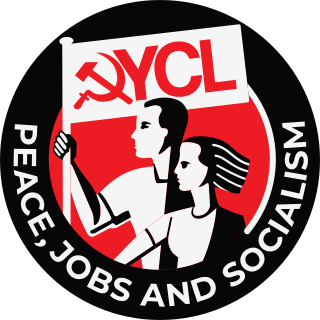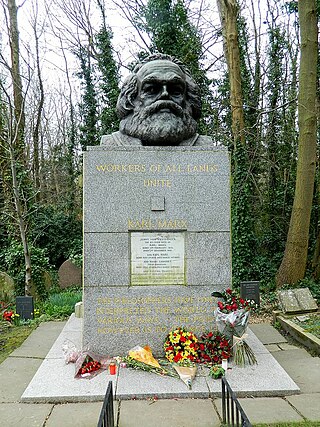Related Research Articles

The Communist Party of Australia (CPA), known as the Australian Communist Party (ACP) from 1944 to 1951, was an Australian communist party founded in 1920. The party existed until roughly 1991, with its membership and influence having been in a steady decline since its peak in 1945. Like most communist parties in the West, the party was heavily involved in the labour movement and the trade unions. Its membership, popularity and influence grew significantly during most of the interwar period before reaching its climax in 1945, where the party achieved a membership of slightly above 22,000 members. Although the party did not achieve a federal MP, Fred Paterson was elected to the Parliament of Queensland at the 1944 state election. He won re-election in 1947 before the seat was abolished. The party also held office in over a dozen local government areas across New South Wales and Queensland.

Socialist Appeal was the British section of the International Marxist Tendency (IMT), founded in 1992 alongside the IMT by supporters of Ted Grant and Alan Woods after they were expelled from the Militant tendency of the Labour Party. The organisation relaunched itself in 2024 as the Revolutionary Communist Party.

Socialism in New Zealand had little traction in early colonial New Zealand but developed as a political movement around the beginning of the 20th century. Much of socialism's early growth was found in the labour movement.
Young Left is a socialist, Marxist, and feminist youth organisation. It is the official youth wing of the Swedish Left Party. The organisation calls themselves a "revolutionary youth organisation with roots in the communist part of the labour movement, anchored in the women's movement and influenced by the environmental- and peace movement."
The League for a Workers' Republic (LWR) was a Trotskyist organisation in Ireland.
Jim Higgins was a British revolutionary socialist and leading member of the International Socialists.

The Communist Party of Latvia was a political party in Latvia.

The Labour Party of Malaya was a political party in Malaya that was active between 1952 and 1969. It was originally formed as a confederation of state based labour parties known as the Pan-Malayan Labour Party (PMLP).
Youth League may refer to any of the following
The Labour Party Young Socialists (LPYS) was the youth section of the Labour Party in Britain from 1965 until 1991. In the 1980s, it had around 600 branches, 2,000 delegates at its national conferences and published a monthly newspaper, Left, later Socialist Youth. From the early 1970s, it was led by members of Militant.
The International Marxist Group (IMG) was a Trotskyist group in Britain between 1968 and 1982. It was the British Section of the Fourth International. It had around 1,000 members and supporters in the late 1970s. In 1980, it had 682 members; by 1982, when it changed its name to the Socialist League, membership had fallen to 534.

The Socialist Labour Party was a socialist political party in the United Kingdom. It was established in 1903 as a splinter from the Social Democratic Federation (SDF) by James Connolly, Neil Maclean and SDF members impressed with the politics of the American socialist Daniel De Leon, a Marxist theoretician and leading figure of the Socialist Labor Party of America. After decades of existence as a tiny organisation, the group was finally disbanded in 1980.

The Young Communist League (YCL) is the youth section of the Communist Party of Britain. Although its headquarters is based in London, the YCL has active branches across England, Scotland, and Wales. Aside from sports and social programs, the YCL heavily focuses on publishing political literature, with its own political journal called Challenge.

The British Socialist Party (BSP) was a Marxist political organisation established in Great Britain in 1911. Following a protracted period of factional struggle, in 1916 the party's anti-war forces gained decisive control of the party and saw the defection of its pro-war right wing. After the victory of the Bolshevik Revolution in Russia at the end of 1917 and the termination of the First World War the following year, the BSP emerged as an explicitly revolutionary socialist organisation. It negotiated with other radical groups in an effort to establish a unified communist organisation, an effort which culminated in August 1920 with the establishment of the Communist Party of Great Britain. The youth organisation the Young Socialist League was affiliated with the party.
The Workers Revolutionary Party (WRP) is a Trotskyist group in Britain once led by Gerry Healy. In the mid-1980s, it split into several smaller groups, one of which retains possession of the name.

The Pathfinder tendency is the unofficial name of a group of historically Trotskyist organizations that cooperate politically and organizationally with the Socialist Workers Party of the United States and support its solidarity with the Cuban Revolution and the Communist Party of Cuba.
Socialism in Hong Kong is a political trend taking root from Marxism and Leninism which was imported to Hong Kong in the early 1920s. Socialist trends have taken various forms, including Marxism–Leninism, Maoism, Trotskyism, democratic socialism and liberal socialism, with the Marxist–Leninists being the most dominant faction due to the influence of the Chinese Communist Party (CCP) regime in the mainland. The "traditional leftists" became the largest force representing the pro-Beijing camp in the post-war decades, which had an uneasy relationship with the colonial authorities. As the Chinese Communist Party adopted capitalist economic reforms from 1978 onwards and the pro-Beijing faction became increasingly conservative, the socialist agenda has been slowly taken up by the liberal-dominated pro-democratic camp.

Far-left politics in the United Kingdom have existed since at least the 1840s, with the formation of various organisations following ideologies such as Marxism, revolutionary socialism, communism, anarchism and syndicalism.
Student wings of political parties in Scotland are University affiliated organisations of Scottish political parties, and therefore often mirror the policy direction of the larger party.
References
- 1 2 Barberis, Peter; McHugh, John; Tyldesley, Mike. Encyclopedia of British and Irish Political Organizations: Parties, Groups and Movements of the 20th Century. A&C Black, 2000, p284
- ↑ Graham Stevenson